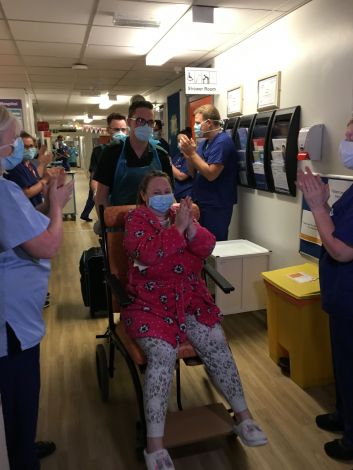Here you’ll find all the support and information about your recovery from COVID-19. Whether you have been isolating at home, or have been treated in hospital, the following guide will support you in your recovery.
What is COVID-19?
COVID-19 is an infectious disease caused by a newly discovered coronavirus strain that first emerged in China in December 2019.
In humans, several coronaviruses are known to cause respiratory infections ranging from the common cold to more severe disease. The new coronavirus outbreak (COVID-19) was declared a pandemic by the World Health Organisation on 11 March 2020.
The most important symptoms of coronavirus (COVID-19) are recent onset of any of the following:
- a new continuous cough
- a high temperature
- loss or change to your sense of smell or taste
If I have COVID-19 what does mean?
The severity and duration of symptoms for people who have COVID-19 can also vary although symptoms are reported to reduce most cases within 7 days of symptom onset.
For most people COVID-19 will be a mild illness. However if you have any of the symptoms listed you should self isolate at home.
Most people who have COVID-19 will not require admission to hospital and can be se home to recover naturally. Others will require monitoring in hospital and a small proportion will require treatment in intensive care.
Here you’ll find all the support and information about your recovery from COVID-19. Whether you have been isolating at home, or have been treated in hospital, the following guide will support you in your recovery.
What happens once I leave hospital?
At this point you are considered well enough to leave hospital. You will have been prescribed medication if required. If you did not require any prescribed medication then you should be able to manage your symptoms yourself at home. Ensure you stay hydrated and take paracetamol if you have a temperature. To aid recovery, try to avoid spending long periods of time lying flat in bed, trying sitting up or in a chair, or moving around at home.
You may have a cough or feel tired or breathless for several weeks despite the COVID-19 having cleared, however if the symptoms persist please call your GP for a review.
For a medical emergency, dial 999 immediately.
You have been identified as having symptoms of COVID-19 infection
You need to go home and self isolate for seven days from the onset of your symptoms. If you live with others they need to isolate for 14 days from the onset of your illness. If anyone else in the household starts displaying symptoms, they need to stay at home for 7 days from when the symptoms appeared, regardless of what day they are on in the original 14 day isolation period.
What happens after my visit to A&E or my GP?
At this point you are considered well enough to manage your symptoms at home. You will have been prescribed medication if required. If you did not require any prescribed medication then you should be able to manage your symptoms yourself. Ensure you stay hydrated and take paracetamol if you have a temperature. To aid recovery, try to avoid spending long periods of time lying flat in bed, trying sitting up or in a chair, or moving around at home.
You may have a cough or feel tired or
breathless for several weeks despite the COVID-19 having cleared, however if the symptoms persist please call your GP for a review.
For a medical emergency, dial 999 immediately.
When you get home
Can I spread COVID-19 to friends and family?
There is a risk that other members of your household or others that you have been in close contact with over the previous two weeks have been exposed to the virus but it is possible that they have not. Advice on how to reduce the risk can be found here https://
What if I feel unwell again?
Monitor your symptoms regularly and if you have any concerns go to: https://www.nhs.uk/conditions/coronavirus-covid-19/check-if-you-have-coronavirus-symptoms/
Protecting yourself and others from coronavirus
- Wash your hands frequently and thoroughly, for at least 20 seconds. Use alcohol-based hand sanitizer if soap and water aren’t available.
- Cover your mouth and nose with a tissue when you cough or sneeze and then throw the tissue in the bin and wash your hands. Alternatively, cough or sneeze into your elbow.
- Avoid touching your eyes, nose and mouth with unwashed hands.
- Avoid close contact with people who are sick, sneezing or coughing.
- Let fresh air in if meeting indoors, or meet outside
- Consider wearing a face covering in crowded, enclosed spaces
- Get tested if you have COVID-19 symptoms, and stay at home if positive
- Get vaccinated


